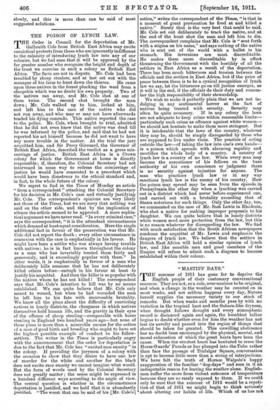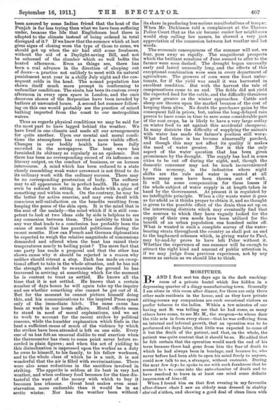" ln.S . 11.F.V DAYS."
THE summer of 1911 has gone far to deprive the English people of their customary conversational resource. They are not, as a rule, over-anxious to be original, and when a change in the weather may be counted on in most weeks, and not seldom happens every day, Nature herself supplies the necessary variety to our stock of remarks. But when weeks and months pass by with no variation in the tropical heat and the Sahara-like dryness, when drought follows drought and every atmospheric record is distanced again and again, the humblest talker begins to doubt whether even for him the weather has not lost its novelty and passed into the region of things that should be taken for granted. This unwilling abstinence has no doubt been encouraged by the physical, mental, and moral exhaustion of which the great heats have been the cause. When the stoutest heart has hesitated to cross the Horse Guards' Parade or has plunged into the Tube rather than face the passage of Trafalgar Square, conversation is apt to become little more than a string of interjections. We have felt the truth of Horace Walpole's happy exaggeration of the familiar "dog-days" and seen in it an indisputable reason for leaving the weather alone. English- men suffer the more from violent extremes of temperature because they are so rarely exposed to them. If we could only be sure that the summer of 1912 would be a repeti- tion of that of 1911 we might begin to think seriously about altering our habits of. life.. Which of us has not been assured by some Indian friend that the heat of the Punjab is far less trying than what we have been suffering under, because the life that Englishmen lead there is adapted to the climate instead of being ordered in total disregard of it ? If we knew that the summer which at last gives signs of closing were the type of those to come, we should get up when the air had still some freshness, without the aid of a Daylight-saving Bill, and not be ashamed of the slumber which so well befits the heated afternoon. Even as things are, there has been a real advance in the direction of sleeping out of doors—a practice not unlikely to meet with its natural punishment next year in a chilly July night and the con- sequent colds in the head. The nomad population has shown itself much more prompt in conforming to unfamiliar conditions. The siesta has been its custom every afternoon in every open space in London, and the once decorous shores of the Serpentine have been invaded by bathers at unwonted hours. A second hot summer follow- ing on this one would probably see the practice of mixed bathing imported from the coast to our metropolitan waters.
Thus as regards physical conditions we may be said for the most part to have lagged behind the weather. We have lived in one climate and made all our arrangements for quite another. -Upon our mental and moral condi- tions the atmosphere has exerted a more visible effect. Changes in our bodily health have been fully recorded in the newspapers. The heat wave has furnished its obituary as regularly as an epidemic. But there has been no corresponding record of its influence on literary output, on the conduct of business, or on human intercourse. A mind which has been reduced to a state closely resembling weak water arrowroot is not fitted to do its ordinary work with the ordinary success. There may be no corresponding prostration of body. The sufferer may to alt appearance be in perfect health. He may not even be reduced to sitting in the shade with a glass of something cool within reach. On the contrary, he may be the better for active exercise, and may even dwell with conscious self-satisfaction on the benefits resulting from keeping the pores of the skin open. It is the mind that is the seat of the malady—the mind which if it is still com- petent to look at two ideas side by side is helpless to see any connexion between them. This inability to think in any way that leads to a conclusion has probably been the cause of much that has puzzled politicians during the recent months. How can French and German diplomatists be expected to weigh the relative magnitude of concessions demanded and offered when the heat has raised their temperatures nearly to boiling point ? The mere fact that one party has made a proposal and that the other has shown cause why it should be rejected is a reason why neither should retreat a step. Each has made an excep- tional effort to take in the whole situation, and he has not the strength needed to re-examine the ground he has traversed in arriving at something which for the moment he is content to treat as settled. He knows all the time that it is not settled. He knows that a certain number of days hence be will again take up the inquiry and see whether something else cannot be got out of it. But for the moment he cannot picture himself doing this, and his communications to the inspired Press speak only of the immediate hitch. The same cause has been at work in our home affairs. Moral effects seem to stand in need of moral explanations, and we set to work to account for the recent strikes by political reasons, while the humbler explanation which finds in the heat a sufficient cause of much of the violence by which the strikes have been attended is left on one side. Every one of us has felt an unusual dislike to real exertion when the thermometer has risen to some point never before re- corded in plain figures ; and when the act of yielding to this disinclination is impressed upon the worker as a duty he owes to himself, to his family, to his fellow workmen, and to the whole class of which he is a unit, it is not wonderful that the air is filled with recriminations. There were also some reductions in the sacrifices involved in striking. The appetite is seldom at its best in very hot weather, and when ordinary food becomes for the time dis- tasteful the want of the money with which to buy it becomes less irksome. Great heat makes even semi- starvation more endurable than it would be in an arctic winter. Nor has the weather been without its share in producing less serious manifestations of temi er. When Mr. Dickinson told a complainant at the Thames Police Court that as the air became cooler her neighbours would stop calling her names, he showed a very just appreciation of the connexion between hot weather and hot words.
The economic consequences of the summer will not, we fear, pass away so rapidly. The magnificent prospects which the brilliant sunshine of June seemed to offer to the farmer were soon dashed. The drought began unusually early and lasted unusually long, and the effects of this exceptional combination were seen in every department of agriculture. The growers of corn were the least unfor- tunate, for if the yield was small it was harvested in excellent condition. But with the harvest the tale of compensations came to an end. The fields did not yield the expected feed for the cattle, and the difficulty threatens to grow greater as the winter approaches. Cattle and sheep are thrown upon the market because of the cost of keeping them alive. No doubt the purchaser gains by the consequent fall in prices, but, unless the long-delayed rain proves to have come in time to save some considerable part of the root crops, he is likely to have a very large outlay on winter feed to set against this accidental cheapness. In many districts the difficulty of supplying the animals with water has made the farmer's position still wora3. What feed there is has become abnormally parched, and though this may not affect its quality it makes the need of water greater. Nor is this the only aspect of the water question that has been given prominence by the drought. The supply has had in some cities to be cut off during the night, and, though the domestic consumer may not be much inconvenienced by this economy, in the industries where night shifts are the rule and water is wanted at all hours many men have been thrown out of work. It will be some compensation for these losses if the whole subject of water supply is at length taken in hand by the Government. At present it is regulated by no intelligible principle. When a city wants water it goes as far afield as it thinks proper to obtain it, and no thought is given to the possible effect of the drain thus set up on the intervening districts which may eventually find that the sources to which they have vaguely looked for the supply of their own needs have been utilized for the benefit of an urban population one hundred miles off. What is wanted is such a complete survey of the water- bearing strata, throughout the country as shall put an end to the haphazard schemes which, in giving water to Paul, may by-and-by prove to have left Peter without it. Whether the experience of one summer will be enough to attract the right kind and amount of public attention is, if we may judge from previous experience, not by any means as certain as we should like to think.











































 Previous page
Previous page